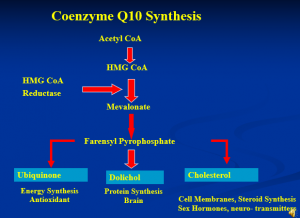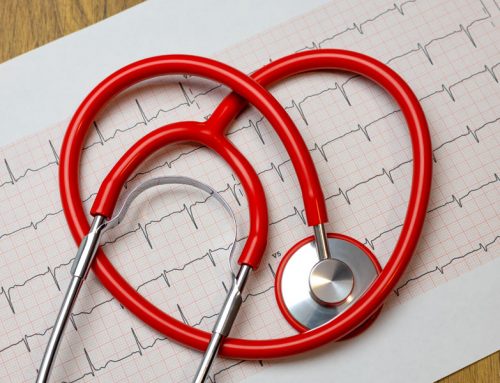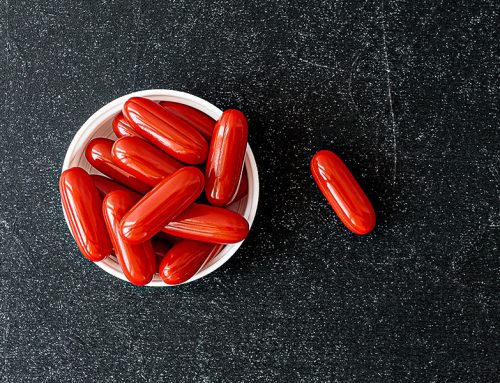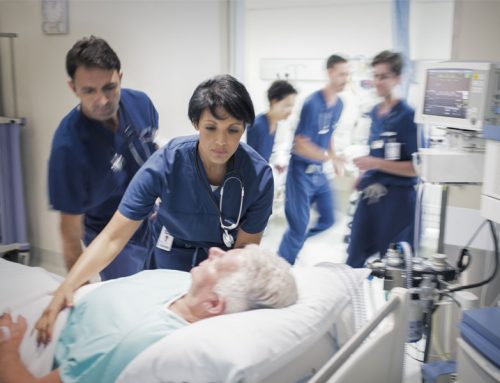Coenzyme Q10 and Red Yeast Rice supplements can lower plasma cholesterol levels. Arguably, red yeast rice extracts are the most effective nutritional supplement for the lowering of cholesterol concentrations in the blood.

This slide provided by Dr. William Judy shows that Coenzyme Q10 and cholesterol are synthesized in the same biological pathway. The inhibition of this pathway by statin medications and by red yeast rice supplements will affect the biosynthesis of both substances.
Monacolin K in red yeast rice is the primary cause of this cholesterol lowering effect. Monacolin K inhibits the activity of the enzyme 3-hydroxy-3-methyl-glutaryl-coenzyme A reductase, which is necessary for the body’s bio-synthesis of cholesterol [Cicero 2021].
Red Yeast Rice Lowers Plasma Cholesterol Levels
Daily consumption of a red yeast rice supplement containing monacolin K is expected to reduce plasma LDL-cholesterol levels by 15% to 25% within six to eight weeks. There should also be a proportional decrease in total cholesterol and in high-sensitivity C-reactive protein, a blood biomarker for inflammation in the body and a useful indicator of the risk of heart attack [Cicero 2021].
Red yeast rice supplements consist of fermented rice that has been grown on the yeast Monascus purpureus. This process gives the red yeast rice its distinctive reddish-purple color. The red yeast rice contains numerous substances called monacolins. It is the monacolin K that has the ability to inhibit the biosynthesis of cholesterol.
Red Yeast Rice and Improved Endothelial Function
Data from some clinical trials suggest that the use of red yeast rice supplements will lead to an improvement in endothelial function and a reduction of arterial stiffness [Cicero 2021].
Note: The endothelium consists of a single layer of cells on the surface of the inside of blood vessels and lymph vessels. These cells are instrumental in the control of the contraction and relaxation of the blood vessels, i.e., blood flow regulation. Damage to endothelial cells increases the risk of atherosclerosis and heart attack.
Safety of Red Yeast Rice Supplements
Research studies show red yeast rice supplements to be safe and well-tolerated. Although red yeast rice supplements are not regulated by the U.S. Food and Drug Administration, the guidelines of the European Cardiology Society and the European Atherosclerosis Society have suggested the use of red yeast rice as an inhibitor of endogenous cholesterol synthesis for the management of mild hypercholesterolemia since 2011 [Cicero 2021].
The safety of red yeast rice supplements depends primarily upon the following factors:
- the quality of the red yeast rice supplement
- the frailty of the patient taking the red yeast rice supplement
- the risk of pharmacological interactions with other medications
Researchers at a 2021 Journal of the American College of Cardiology Focus Seminar concluded as follows [Cicero 2021]:
- The risk related to a daily intake of 3 to 10 mg of monacolin K, the key ingredient in the red yeast rice, is minimal.
- Red yeast rice supplements represent a therapeutic tool to support the management of mild to moderate hypercholesterolemia in low-risk patients, especially those patients who cannot be treated with statin medications or other LDL-cholesterol–lowering therapies.
Combined Coenzyme Q10 and Red Yeast Rice Supplementation
Remember, in inhibiting the body’s synthesis of cholesterol, statins and red yeast rice supplements will also inhibit the synthesis of Coenzyme Q10. Therefore, it is especially important to take CoQ10 supplements in the period in which you are taking a red yeast rice supplement or a statin medication [Okuyama 2015].
A further bonus of taking daily CoQ10 supplements is that randomized controlled studies show that Coenzyme Q10 also has a beneficial effect on cholesterol levels [Liu 2022].
Beware of Citrinin in Red Yeast Rice Supplements
During the fermentation of the rice, there could be a dangerous byproduct of the process called citrinin. In preclinical studies, citrinin has been associated with toxic effects on the kidneys, with increased risk of cancer, and with reproductive toxicity [Cicero 2021].
Users of red yeast rice products should insist on a certified absence of citrinin as well as a documented absence of aflatoxin, dioxins and heavy metals.
Conclusion: Red Yeast Rice Safe for Lowering Cholesterol
A 2023 review of relevant research literature has revealed that red yeast rice supplementation reduces low-density lipoprotein cholesterol levels by approximately 15–34% versus placebo [Cicero 2023].
Red yeast rice has demonstrated beneficial reductions of up to 45% versus placebo in the risk of atherosclerotic cardiovascular disease events in secondary prevention studies [Cicero 2023].
Red yeast rice supplements at a dose that provides about 3 mg/day of monacolin K are well tolerated [Cicero 2023].
Sources
Cicero AFG, Fogacci F, Zambon A. Red yeast rice for hypercholesterolemia: JACC Focus Seminar. J Am Coll Cardiol. 2021 Feb 9;77(5):620-628.
Cicero AFG, Fogacci F, Stoian AP, Toth PP. Red Yeast Rice for the Improvement of Lipid Profiles in Mild-to-Moderate Hypercholesterolemia: A Narrative Review. Nutrients. 2023 May 12;15(10):2288.
Liu Z, Tian Z, Zhao D, Liang Y, Dai S, Liu M, Hou S, Dong X, Zhaxinima, Yang Y. Effects of Coenzyme Q10 supplementation on lipid profiles in adults: A Meta-analysis of randomized controlled trials. J Clin Endocrinol Metab. 2022 Dec 17;108(1):232-249.
Okuyama H, Langsjoen PH, Hamazaki T, Ogushi Y, Hama R, Kobayashi T, Uchino H. Statins stimulate atherosclerosis and heart failure: pharmacological mechanisms. Expert Rev Clin Pharmacol. 2015 Mar;8(2):189-99.
The information presented in this review article is not intended as medical advice and should not be used as such.









How can I order this product.
Hi Marie
In Ireland, you could try 353 1 899 1650 or online at https://www.pharmanord.ie/webshop/products.
Good luck,
Richard
Is it OK to take red yeast rice supplement and bio active Q10 together as in one capsule if each daily.
Thank you
Katherine
Hello Katherine –
It is important to talk with your health care professional about your decision to take red yeast rice supplements for their cholesterol lowering effect.
When you talk with your health care professional, you can share with him or her the conclusion in a 2021 Journal of the American College of Cardiology focus seminar: “The clinical syndromes of statin-associated muscle symptoms and some of the features observed in patients with heart failure may be related to blood and tissue deficiency of CoQ10. Numerous clinical trials of CoQ10 in statin-associated muscle symptoms have yielded conflicting results. Yet, the weight of evidence as reflected in meta-analyses supports the use of exogenous CoQ10 in statin-associated muscle symptoms.”
That will then be a good opportunity to talk with him or her about taking the Coenzyme Q10 and the red yeast rice at the same meal.
Source: Raizner AE, Quiñones MA. Coenzyme Q10 for Patients With Cardiovascular Disease: JACC Focus Seminar. J Am Coll Cardiol. 2021 Feb 9;77(5):609-619.
I have not seen any warning against taking Coenzyme Q10 and a red yeast rice supplement at the same meal.
The precautions for taking red yeast rice supplements that I have read include the following:
Best taken with a standard meal.
Best taken with the evening meal as the endogenous synthesis of cholesterol is highest during the night.
Pregnant and lactating women and persons on prescription medications should seek professional advice prior to taking supplements.
Do not exceed the recommended amount.
Should not be used by anyone who is pregnant, trying to become pregnant, or breast-feeding.
Should not be taken by anyone with liver disease or a high risk of liver disease, kidney disease, thyroid disorders, musculoskeletal disorders, serious infections, or an organ transplant.
You know that it is best for the absorption of the CoQ10 supplement to take it together with a meal containing some fat.
You may find that taking the CoQ10 supplement in the evening gives you too much energy at bedtime.
If that is the case, then Coenzyme Q10 at breakfast and/or lunch and red yeast rice in the evening may work best for you.
Best regards,
Richard
Hi, I had an Heart Attack 2020 & had two tents fitted I’m on Statins along with other Heart pills should I talk with my Doctor first before taking them
Catherine Carling
Dear Catherine,
Yes, by all means, consult with your cardiologist.
He/she may have seen this journal article in the Journal of the American Cardiology College publication.
Raizner AE, Quiñones MA. Coenzyme Q10 for Patients With Cardiovascular Disease: JACC Focus Seminar. J Am Coll Cardiol. 2021 Feb 9;77(5):609-619.
Abstract. Coenzyme Q10 is a naturally occurring compound that is found in animals and all humans. It has a fundamental role in cellular energy production. Although it is produced in the body, tissue deficiency can occur due to medications such as statins, which inhibit the mevalonate pathway. The clinical syndromes of statin-associated muscle symptoms (SAMS) and some of the features observed in patients with heart failure (HF) may be related to blood and tissue deficiency of CoQ10. Numerous clinical trials of CoQ10 in SAMS have yielded conflicting results. Yet, the weight of evidence as reflected in meta-analyses supports the use of exogenous CoQ10 in SAMS. In patients with HF, large-scale randomized clinical trials are lacking, although one relatively contemporary trial, Q-SYMBIO, suggests an adjunctive role for CoQ10. The possibility that statin-related CoQ10 deficiency may play a role in patients with diastolic HF is an intriguing hypothesis that warrants further exploration.
Best wishes,
Richard